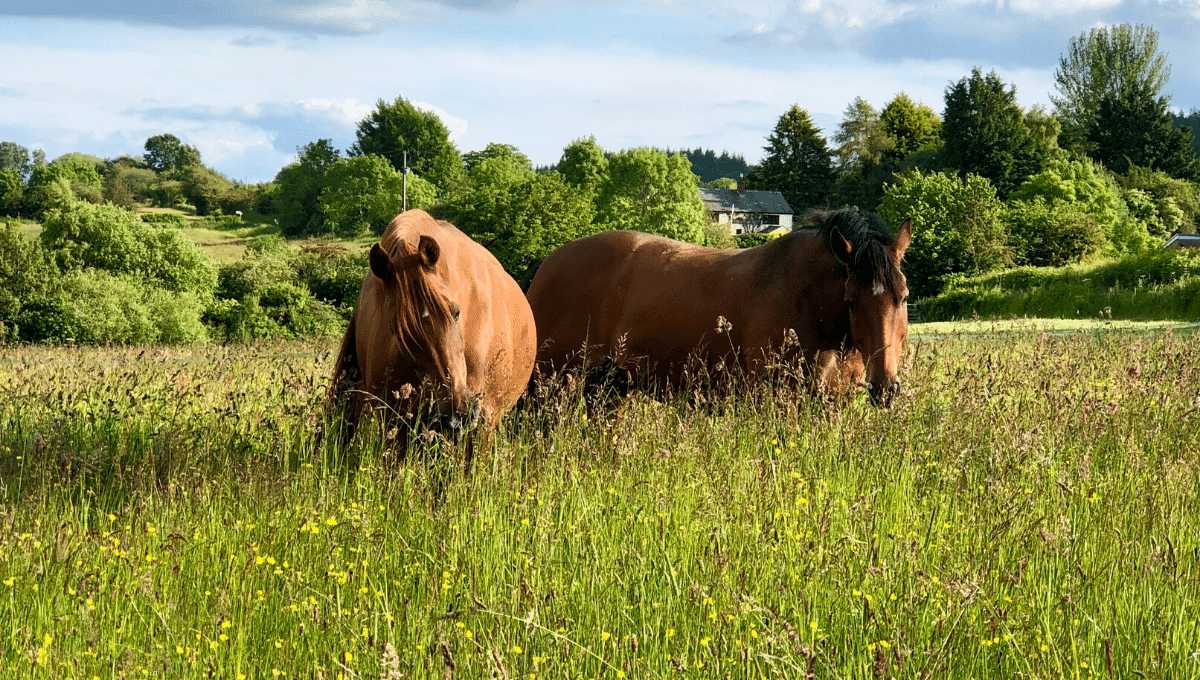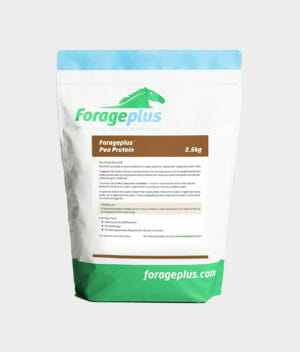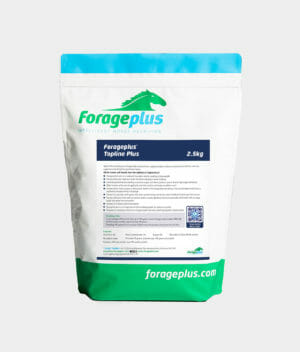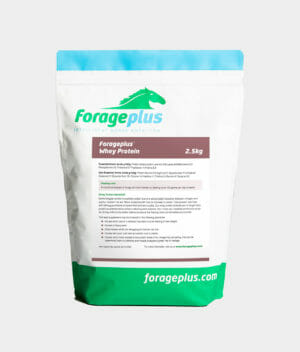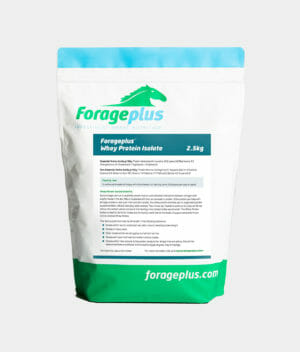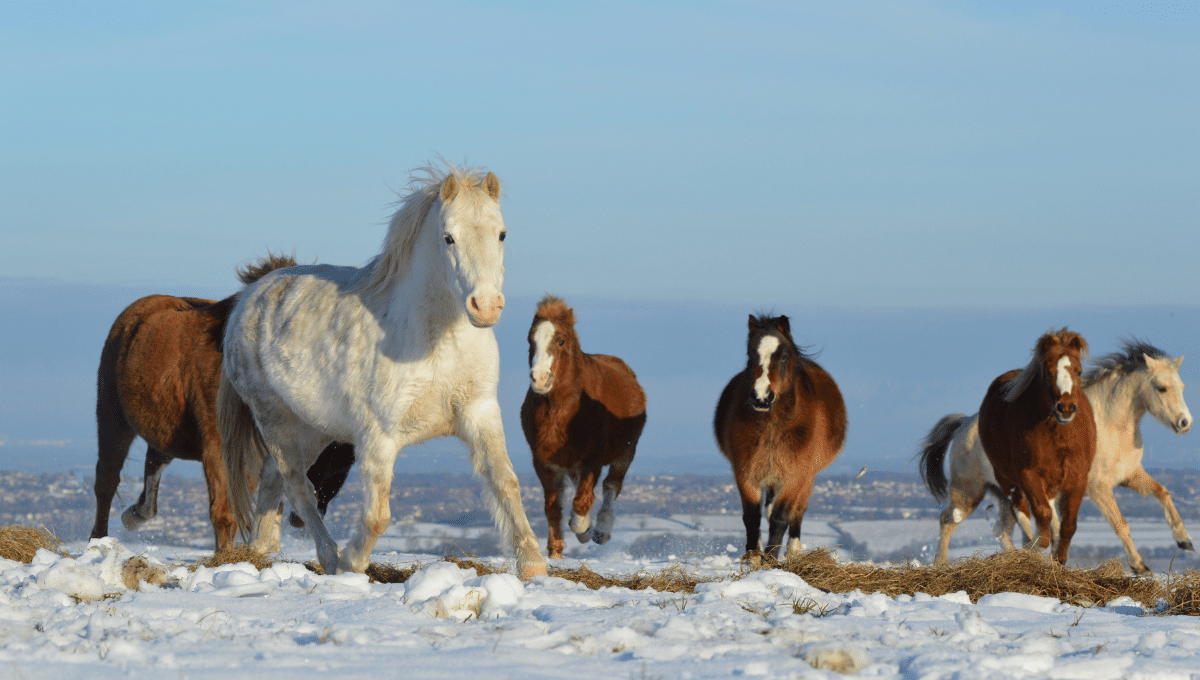Good levels of protein in the horse’s diet will maintain and support health and well-being, but how much protein does a horse actually need?
Will a horse get enough protein in the daily diet and why is protein for horses important?
The health of your horse is affected by many things. A healthy horse is created when the environment where a horse lives and eats provides adequate social interaction, correct movement and correct training – if ridden.
Perhaps most importantly, as the structural building block of all that your horse is, the food and nutrition your horse is exposed to on a daily basis are crucial. Considering the amino acid composition of the proteins in your horse’s diet is essential for supporting growth, pregnancy, lactation, and muscle building.
Additionally, understanding the concept of crude protein helps ensure that different classes of horses receive proper nourishment through their protein intake.
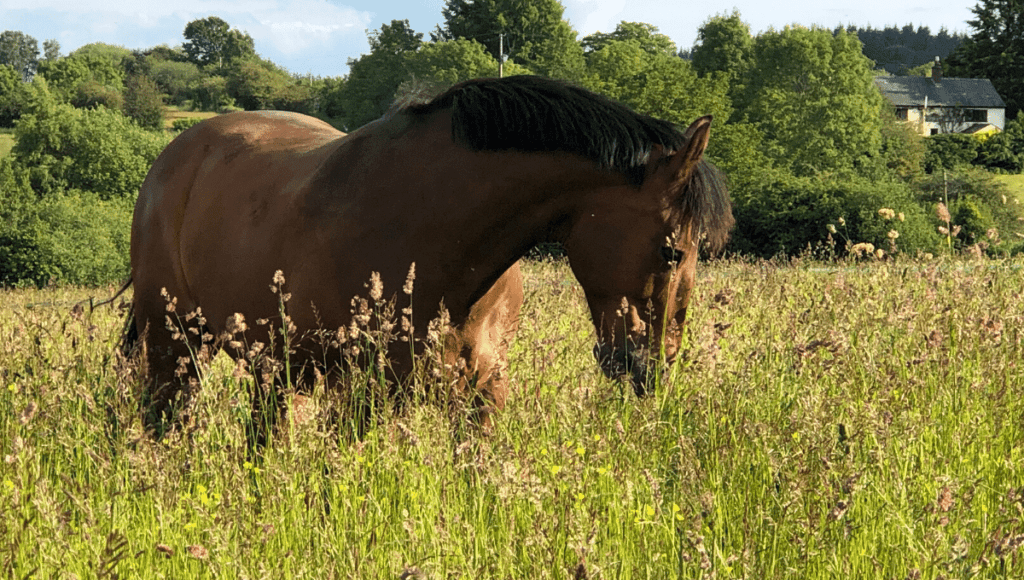
What is protein for your horse?
Protein is a complex and convoluted structure composed of a string of amino acids that folds and coils according to electrical attractions between the amino acids in the chain. It is the most abundant substance in all body tissues, next to water.
Proteins form skin, organ structures, tendons, ligaments, cartilage, bone scaffolding, enzymes, antibodies, DNA/RNA, haemoglobin, cellular receptors, cytokines, and many hormones. They are also critical for immune function, as antibodies, cytokines, and the complement system are all manufactured from protein.
The sequence of amino acids in a protein is encoded in the DNA, and each protein has its own distinctive formula. Amino acids are the smallest building blocks of proteins and are ready to be absorbed without requiring any further digestion.
How important are amino acids?
Amino acids are the building blocks of proteins. They are organic compounds composed of nitrogen, carbon, hydrogen, and oxygen, along with a variable side chain group. Your body needs 20 different amino acids to grow and function properly.
Though all 20 of these are important for your health, only nine amino acids are classified as essential. These are histidine, isoleucine, leucine, lysine, methionine, phenylalanine, threonine, tryptophan, and valine.
Unlike nonessential amino acids, essential amino acids can’t be made by the body and must be obtained through the diet. The sequence of amino acids in a protein is dictated by the DNA. If an essential amino acid is next in sequence but is not available, the assembly of the protein strand will stop.
What do essential amino acids in a horse diet do?
Without good quality nutrients, including amino acids, each day, your horse will not maintain the structural strength in cells, nerves, hooves, vital organs, tendons, ligaments, muscles, and bones to have a long, sound, and active life. Essential amino acids, which cannot be synthesized in the horse’s body, are particularly important for protein synthesis and overall health.
Without nutrients supplied at the right levels and in the right ratios with each other, your horse will not be able to function efficiently on a whole system level.
The elements of nutrition that are important for life are calories (referred to as DE when discussing horses), minerals, vitamins, and protein. Out of all these, horse protein at the right level and quality is the most important, but least understood and usually least measured in the total diet of the horse. Yet protein is vital, essential, and crucial for a healthy horse’s diet, and just assuming it is sufficient on a daily basis is not enough.
Here are five main reasons for making sure that you understand the role horse protein has in health.
Five reasons protein is vital for horses
1. Protein is quite literally life!
It is fundamental to every process in the body. Protein provides the structure that makes connective tissue of bones, ligaments, tendons and muscles. Protein also makes a lot of other things in the body; defence mechanisms for strong immune systems, sensors, healthy hair, healthy skin and strong sturdy well well-functioning hooves.
2. Without a certain level of protein your horse cannot maintain and support health.
A deficiency each day or each week means that a cumulative shortage of protein will result in structural weakness where the body struggles to maintain health due to a lack of building blocks to create strong sturdy structures. Obviously as time marches on more and more structural integrity is lost and failures in body structures are seen. If you see weakness in hooves, tendons, skin, immune system, digestive system, bones, ligaments and tendons then you may well be looking at protein deficiency. Excess protein is excreted in urine, making it unlikely to cause problems like filled legs.
3. Protein, in forage levels here in the UK and Europe, is usually too low.
Protein, in forage levels here in the UK and Europe, is usually too low to provide what is needed for adult horses on a daily basis (figures from NRC 2007). From our own analytical data, we know that at least 85% of the hay tested fell below the minimum protein requirements that horses need to sustain health.
From our experience, most horses have access to poor quality, over-grazed pasture and hay or haylage that might look good but when tested, scientifically, reveals poor protein levels and quality commonly at 5 – 6% per kg of forage fed. This low-quality protein fails to meet the nutritional needs of horses.
4. Your horse’s health starts with forage.
Since grass, hay or haylage is the greatest proportion of your horse’s diet this is the most sensible and cost-effective place to start. An average 500 kg horse will consume around 10kg of hay per day if allowed ad-lib access, on green and growing pasture this will convert to around 50 kg of grass, assuming a dry matter content of 20%.
So, a year of hay consumption will equate to a staggering 3.6 tonnes a year, and grass consumption will equate to 18.25 tonnes. Ignoring the forage component of a horse’s diet and concentrating solely on the bucket feed each day is not sensible or cheap. Since the forage proportion of the diet is going to be the primary source of protein, it is critically important to know whether your hay or pasture is a reserve of poor or high-quality protein.
If you can, this should be the best and greatest source of protein. Ideally, it should supply all the protein needs for an adult horse in maintenance to light work. Non-essential amino acids are also important but can be synthesized by the horse’s body.
5. Young horses, breeding mares, horses in work.
Young horses, breeding mares, horses in medium to heavy work and horses which are good doers or prone to laminitis are particularly at risk from protein deficiency.
Young horses and breeding mares need large amounts of protein in their diet to support the growth and development of the foetus or the production of milk. Where protein is under-supplied the growth and development of the foetus or foal will be affected.
Horses in medium to heavy work needed enhanced levels of protein which may not be supplied even when fed a substantial bucket feed. This is because on average Forageplus scientific analysis of forage shows protein levels to be commonly around 5-6% where horses in substantial exercise need 8% plus.
Horses and ponies prone to laminitis are often fed restricted hay and grass and fed either no bucket feed or a token bucket feed just to carry vitamins and minerals. Where protein is low in forage, this can have a significant impact on the total amount of protein consumed and thus the ability to support recovery and healing.
If you have any questions about the protein levels in your horse’s diet, just contact Forageplus with your questions. We are always happy to share our knowledge and experience.
As horse owners, riders and trainers we know that the most important thing is to build health and resilience in the whole horse so that we can share a lifetime of fun with our equine partners.

